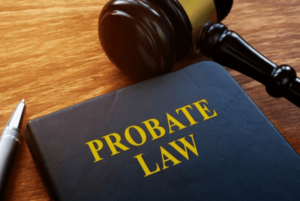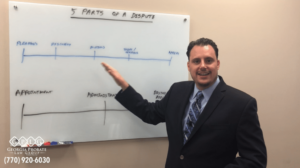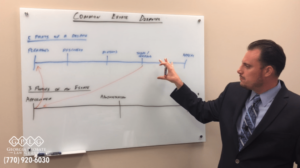Probate litigation is scary to think about and even more terrifying to experience firsthand. The possibility of family members becoming enemies or estate assets turning into legal fees is seriously concerning. Wouldn’t it be better to know how to deal with a probate dispute when it happens and how to prevent conflicts in the first place?
If the idea of probate litigation confuses and alarms you, this article will shed light on the subject.
What Is Probate Litigation?
Probate litigation is a lawsuit that takes place in probate court and refers to disagreements on how a probate estate is managed.
Usually, it is filed by beneficiaries or heirs against a personal representative or a third party.
Common Reasons Why Probate Litigation Comes Up
Why do disputes come up in probate in the first place?
Recognizing the causes of probate conflict helps nip it in the bud. The following are the most common reasons for estate disputes:
Lack of trust between family members
- The family members may have had personal issues, such as sibling rivalry, that led them not to trust each other during this time.
- The family may not be close or have estranged family members. They do not know each other well, so there is no foundation of trust. The executor or administrator might also hold grudges towards one of the heirs or beneficiaries, or vice versa.
Communication issues
- Family members have not been actively communicating with one another about the estate. For example, the personal representative may be evasive when someone initiates a discussion about the estate.
- Certain family members may be excluding others in decision-making.
Questions about documentation
- Family members have differing views about the terms of the will. Their loved one may have told them something different from what is in the will. Or the deceased may have promised to pass down a specific property to a beneficiary, only for them to find that this was not written in the will.
- Partitioning estate assets does not make sense. Family members may question the legitimacy of the estate planning process and documentation, including the will.
- Contents of the will seem suspicious in terms of the distribution.
For example, the personal representative has a significant cut, while the beneficiaries or heirs have little to none.
There are many other reasons that can spark disagreement between parties involved in the probate process that are not listed above. The ones mentioned are just the most common.
When Can a Dispute Come Up in the Probate Process?
A dispute can come up in any of the following phases of the probate process:
Appointment Phase
If there is a will, someone in the family may not agree that it is valid and would want to contest it. Or someone may distrust the executor and intend to challenge their appointment to the role.
On the other hand, if there is no will, the family may disagree on who can best serve as the administrator. In some cases, someone in the family could attempt to contest the person requesting to become the administrator.
Administration Phase
An heir or beneficiary could feel like the executor or administrator is mishandling the estate.
They could file in court against the personal representative, attempting to have the court demand an accounting or remove them from their position.
Distribution/Distribution Phase
An heir or beneficiary could disagree with the amount that the executor or administrator says they will receive from the estate.
Overall, a dispute can occur at any point in the probate process.
What Is the Typical Process of an Estate Dispute?
Understanding the estate dispute process helps you prepare any necessary documents, whether you are the complainant or the defendant, and set proper expectations of what is about to happen.
The probate litigation process goes through these five phases:
5 Phases of a Probate Litigation
Pleadings
Pleading is making a formal accusation or allegation against the other party. The dispute begins with this phase, where each party states the legal basis for their claim.
In an estate situation, a pleading or an allegation examples may be:
- “I think that the will you’ve presented to the court is fraudulent or invalid, and I think that the court should overturn that will.”
- “I’m not sure what’s going on in this estate. I’ve asked for information. I’m not getting any information that I asked for or the information I’m getting is not making sense. I would like a full accounting of this estate so that I can determine whether it looks like things are going correctly or not.”
- “I know that the things that are going on in this case are not good. The executor is not following all the duties that an executor has. I would like that executor to be removed, and I would like a different person to be put in that position who will handle the estate properly.”
Each of these is an example of an allegation. That’s not an exhaustive list, however. Those are some pleadings that we often see in Georgia probate disputes and in our office.
Discovery
Discovery is just a fancy word for investigation, and it allows us to investigate the facts surrounding the allegations that were made.
In this phase, each party uses legal tools to gather evidence to support their claims in their pleadings. Some of these legal tools are:
- Sending written questions to the other side and requiring them to answer those questions or requesting documents from them.
- Bringing people into a deposition. We have a party we’re going to depose, and we’re able to have a court reporter there to ask them questions and make them answer those questions on the record so that that can be used as evidence as well.
- Inspecting a property.
Why are we doing all this?
Because we have to produce evidence to support the allegations that we made in the pleadings phase.
If we don’t have evidence to support those allegations, our case will not go well when we present it in court.
The court may decide against us because the court can’t just look at allegations of what we think is going on; the court has to look at the evidence we can produce showing what’s actually going on. That’s why discovery is important.
Motions
Motion is when a party in the dispute asks the court to do something or make a decision. The most common are motion to compel and motion for summary judgment.
These may happen anytime during a case, but many occur after the discovery is complete.
Some Examples:
- “Judge, I sent off some requests for information or documents to the other side. They are not responding to me, and they’re not giving us the documents we’ve asked for. Please make them give us the documents.” That would be a motion to compel.
- “Judge, we have done a lot of discovery. We’ve produced a lot of evidence. In fact, the evidence that we’ve been able to gather is so abundantly crystal clear that it shows that there’s no need to have a jury or trial in this case. The court can just decide right now as a matter of law, and in this case, they can decide in my favor because the evidence we have is so clear.” That would be a motion for summary judgment.
Those are two motions that are often made in cases to give you some examples. There are many, many other types of motions that could be made.
Trial or Hearing
A trial or a hearing is the main event of the dispute.
At this stage, the parties present their evidence and witnesses, and the court determines the outcome of the claims made during the pleadings.
Either party will attempt to convince the court to favor them based on the evidence provided.
Throughout the case, there can be and probably will be other hearings.
If we filed a motion for summary judgment or a motion to compel, the court will often order a hearing on those motions, and we’ll go to court and argue about those particular items in the case.
By trial or major hearing, we mean the trial of the case. At this trial, the court will hear and consider the pleadings we made at the beginning.
We’re going to present the evidence we discovered in our investigation and ask the court to decide in our favor based on that evidence. The other side is going to do the same thing, trying to get the court to decide in their favor based on the evidence they’re presenting.
But at the end of this hearing, at the end of this trial, that’s going to decide all the matters in the case. And so the case will be finished once that ends.
Appeal
Though not often used, an appeal can be filed when a party believes that the judge made a mistake at the trial that would affect the case’s outcome.
Most people refrain from using appeals because, to file an appeal, a legal mistake must be made by the court. It is not something you can do just because you are not pleased with the result of the trial.
Settlement May Change the Course of the Probate Litigation
As the case is going on, there’s often going to be settlement talks between the parties.
In fact, in Georgia, in virtually every metro county, the judge, at some point, is going to order a probate mediation.
A mediation is nothing more than a formal settlement discussion in which both parties and their attorneys come together in a conference room to discuss their issues in an effort to settle them. A mediator is present.
Mediation is not binding unless the parties come to some sort of agreement and agree to make it binding.
When litigation starts, there are two paths that it can go down.
It can proceed all the way to the final trial of the matter, which would be the conclusion or the end of the case, or it could end at any point before trial if the parties come to some sort of negotiated settlement or some kind of agreement.
That agreement could be just about anything.
- It could be one party dismisses entirely. They decide to quit fighting over it.
- It could also be where the parties come to an agreement that’s some sort of a compromise between what the various allegations have been.
How to Prevent Probate Litigations and Disputes?
Estate battles can be chaotic once they start, so it’s best practice to take proactive steps to avoid them and try to keep relationships intact.
If you are the personal representative, you must:
- Familiarize yourself with the probate laws of Georgia
- Act in the best interests of the heirs and beneficiaries
- Keep accurate records of all estate-related transactions
- Proactively report the probate progress to heirs or beneficiaries
- Refrain from doing actions that may appear self-dealing
If you are an heir or beneficiary, you should:
- Familiarize yourself with the terms of the will and understand your rights
- Communicate effectively with the executor or administrator of the estate and politely express any concerns or questions you have regarding the probate process
- Be patient and understanding since probate is time-consuming
- Be willing to compromise if matters do not go the way they should
- Be cooperative when working towards a solution in the best interest of all the parties involved
Most Common Types of Estate Disputes
From the moment the will is made known to family members up to the point of distribution, conflicts can happen at any time. These are the most typical types:
- Contests on the validity of the will
Someone may question the will’s validity if he believes the will is obtained by undue influence or if the testator (the person who makes the will) was incapable of making decisions at the time of will-writing. - Disputes over asset distribution
Heirs and beneficiaries may disagree on how the personal representative distributes the assets. They may accuse the personal representative of being unfair, unjust, and unequal, or a specific family member may have yet to receive the property the decedent promised them. - Disagreements with the appointed personal representative’s estate administration
Conflicts may arise if the heirs or beneficiaries suspect that the executor or administrator is mismanaging the estate.
How Are Disputes in an Estate Situation Resolved?
Family members may have conflicting interests, but ultimately, everyone has one goal—to resolve probate litigation and move on with their lives.
The following ways can help resolve disputes:
Negotiations
It can start with informal negotiations that could lead to a settlement, typically between the attorneys at different points throughout a dispute.
Mediation
Another way is through mediation. It is a formal process designed to encourage settlement, and the court requires it in almost all cases. All parties meet, and a mediator is present to help resolve issues and determine if a settlement is possible.
Settlement
If all parties agree, a dispute can end immediately with a written settlement. Since there are very few limits on what the parties can agree upon, all options are on the table.
Hearing or Trial
If all attempts to resolve the dispute have failed, a hearing may occur. Both parties must produce evidence, an investigation will take place, and the probate court judge will decide on the outcome.
Your Next Step
While this guide provides an overview of how disputes work in probate, it may not be enough to keep you out of trouble, mainly if family disputes have already occurred years before a loved one’s passing.
We recommend that you seek assistance from an experienced probate litigation attorney to navigate the situation as stress-free as possible. If you have any questions or concerns regarding the probate process, contact our office at (770) 796-4271.
More information
Disclaimer These websites have not been reviewed by Georgia Probate Law Group and are not endorsed or even recommended by Georgia Probate Law Group. These websites are additional resources that you can use to further your general education on this topic.
Disclaimer: The information above is provided for general information only and should not be considered legal advice. Our probate attorneys provide legal advice to our clients after talking about the specific circumstances of the client’s situation. Our law firm cannot give you legal advice unless we understand your situation by talking with you. Please contact our law office to receive specific information about your situation.































